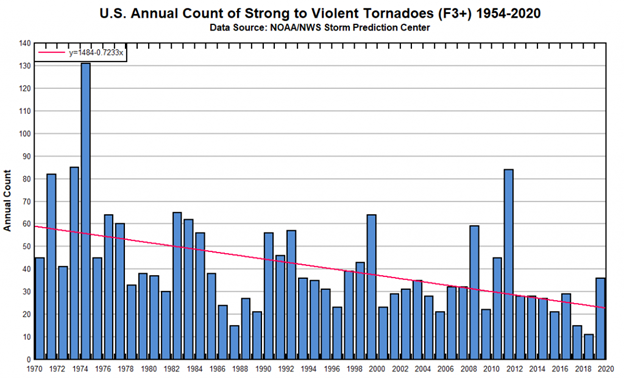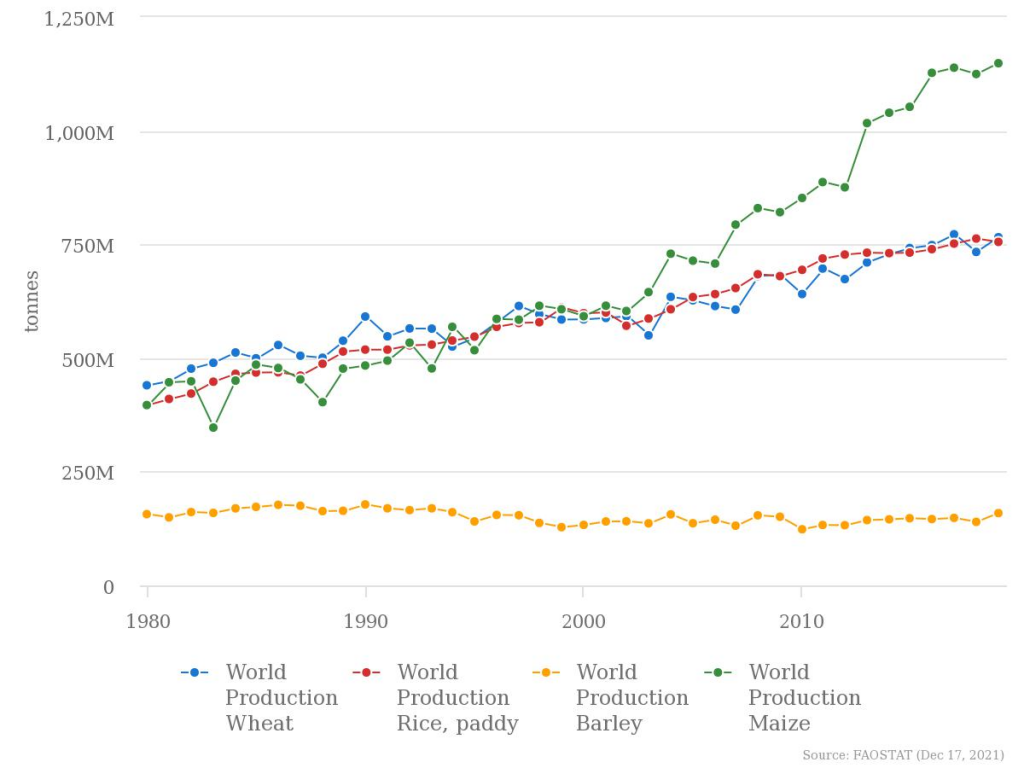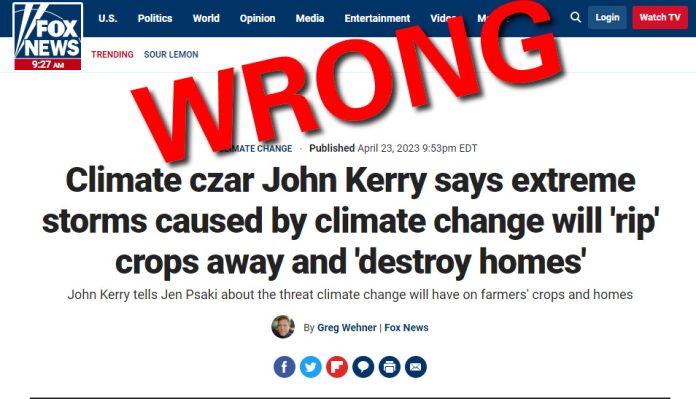A Fox News article, titled “Climate czar John Kerry says extreme storms caused by climate change will ‘rip’ crops away and ‘destroy homes’” quotes Kerry saying that climate change is devastating crops, destroying homes, and killing people, problems that Kerry claims will only become worse in the future.
The article cites an interview with MSNBC’s Jen Psaki, reporting:
The former Democratic candidate told Psaki 15 million people die every year because of bad air quality, and another 10 million people die because of extreme heat, as “it’s getting hotter.”
Kerry also said there are going to be more intensive weather events that will cost the country “an awful lot more money.”
“So, as that happens, as people see their farms, you know, their crops ripped away, or their homes destroyed, you watch the pressure grow,” Kerry said. “I believe we’re in a transformational moment. I think this will be one of, if not the, but it will be one of the top three issues in the ‘24 presidential election. No question in my mind.”
Kerry’s claims concerning storms and crops are provably wrong.
Hard data show storms are not getting worse as Kerry claims. Violent storms that spawn tornadoes have declined as discussed in Climate at a Glance: Tornadoes.
The number of tornadoes in the United States, as well as in other countries, has been slowly declining for the past 45 years. At the same time, the number of strong to violent tornadoes, EF3 or higher, have dramatically declined over the past 45 years. (See Figure 1.)
In fact, the United States set a record in 2017–18 for the longest period in recorded history without a tornado death, and it set a record for the longest period in history (306 days) without an EF3 or stronger tornado. The two record-low years for tornado strikes in the United States both occurred this past decade, in 2014 and 2018.

Even the U.N. Intergovernmental Panel on Climate Change (IPCC) has acknowledged, “[t]here is low confidence in observed trends in small spatial-scale phenomena such as tornadoes.
Likewise, data shows hurricanes have also not increased as the planet has modestly warmed. The United States recently went through its longest period in recorded history without a major hurricane strike.
The IPCC largely agrees with this view. In its 2018 interim report, the IPCC stated there is “only low confidence for the attribution of any detectable changes in tropical cyclone activity to anthropogenic influences.” Similarly, in the IPCC’s AR6 WG1 report, released in August 2021, the IPCC noted,
“Identifying past trends in TC [tropical storm] metrics remains a challenge,” a statement that essentially admits scientists have yet to identify a solid measurable upward trend in the data.
The other crop-destroying weather issue facing farmers is floods, and those are decreasing as well.
The IPCC reports it has “low confidence” climate change is impacting flooding. The U.N. IPCC admits having “low confidence” in even the “sign” of any changes—in other words, it is just as likely that climate change is making floods less frequent and less severe.
Of course, with data showing less severe weather in the form of floods, hurricanes, and tornadoes, it almost goes without saying that damage losses to homes and businesses, when adjusted for economic growth and inflation, have also significantly declined.
Kerry’s concerns about agriculture are equally misplaced. If he were correct, surely with climate change running unchecked for 30 plus years it would have had some deleterious effect on food production, but none can be found. Rather, crop production has significantly improved during the recent period of modest warming. Data from the United Nations Food and Agriculture Organization (FAO) show the global production of the world’s most important crops continued to set records amid modest warming over the past few decades, as seen in Figure 2.

As my colleague Linnea Luken explains in an article on Climate Realism,
As has been discussed in more than 150 articles on Climate Realism, what is true of global cereal production is true for most crops, like fruits, legumes, tubers, and vegetables, in most countries around the world. Yields have set records repeatedly during the recent period of climate change, food security has increased, and hunger and malnutrition have fallen.
To sum up, the data clearly shows that Kerry’s statements about crops and severe weather are false.
Finally, there’s this from the article.
She [Jen Psaki] asked Kerry if he could make the case for climate change to be the most important issue, instead of the fifth most important issue.
“It is an existential issue,” Kerry said. “It is an issue where people today are dying.”
The former Democratic candidate told Psaki 15 million people die every year because of bad air quality, and another 10 million people die because of extreme heat, as “it’s getting hotter.”
Once again, data debunks Kerry’s claims that climate change is causing more deaths. Real-world data show temperature and weather related deaths have declined dramatically, over the past century.
Multiple lines of evidence prove Kerry is wrong on all counts. If, evidence to the contrary, Kerry believes everything he says, perhaps it is time he retires. Armed with bad information and easily falsified opinions, it is dangerous for him to be wielding power and influence over public policy. Kerry’s unjustified fearmongering is more dangerous than climate change itself.

















